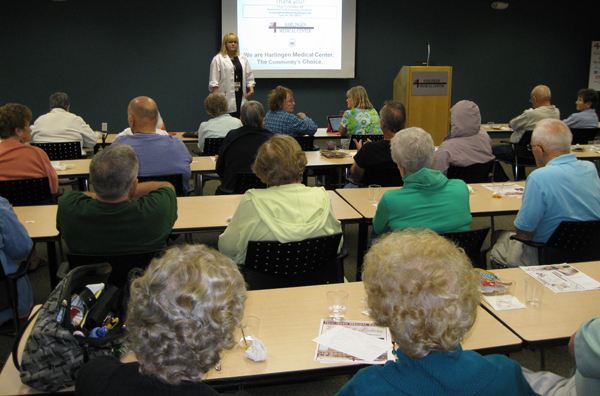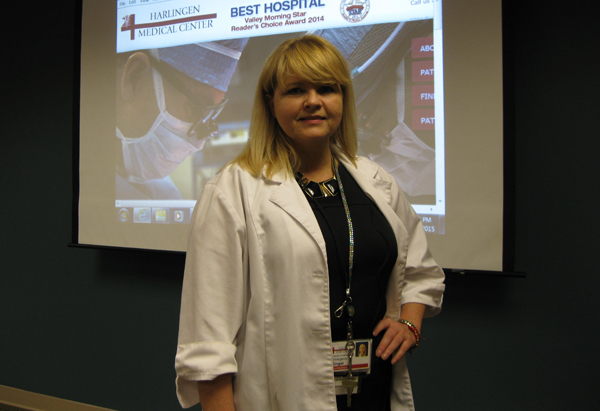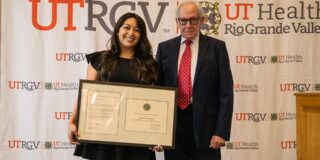- La Feria Native Soon To Retire From The Military This Summer
- Senior Eneece Avila Takes Pride in her State Title
- Dr. Noemi Infante, Harlingen Medical Center Open New Women’s Clinic
- Santa Rosa Cameron County Park Partially Reopens
- Santa Rosa Takes to Regionals Meet in Kingsville, Tx
- Long-Standing Nexstar Tower in La Feria Decommissioned
- Lionettes Powerlifting Meet
- Local Business Holds Event to Benefit RGV Shriners Club
- Knights of Columbus Holds it’s 30th Annual Golf Tournament
- KGBT Tower Dismantled
Program Coordinator Talks About Strokes and Trauma
- Updated: March 10, 2015
Latest Advances at Harlingen Medical Center

Full house for HMC Doc Talk lecture by Ginger Cunningham, RN.
Harlingen Medical Center has moved to upgrade its already top-rated Trauma and Stroke Program by bringing in a Programs Coordinator from a hospital in Dallas, Texas where she was head of the Trauma and Stroke programs. The Valley public got to meet and listen to her during her Doc Talk Lecture, “Stroke Symptoms and Prevention,” at the Harlingen hospital during National Heart Month
The lecturer was Ginger Cunningham, RN and Trauma and Stroke Programs Coordinator at Harlingen Medical Center (HMC). And, who better than a hands-on registered nurse who sees patients and their stressed-out families on a daily basis to understand their fears and can answer their questions. Ginger Cunnningham, RN, is that type of healthcare worker.
Cunningham got everybody’s attention when she asked her audience–Why should you care about strokes? She answered her own question with: “because it’s the fifth greatest cause of death, and every 40 seconds someone, somewhere in the United States has a life-threatening, life altering stroke, and 1 in 3 Americans can’t even recall any of the stroke warning signs–that’s why.”
The speaker continued her appeal to the audience to realize that many of these strokes can be prevented and even reversed if caught on time–that time being within three hours of the stroke, and being checked into and being treated in the Emergency Room of the nearest hospital. “Stroke is a disease that affects the arteries leading to and into the brain. Speed is the bottom line for survival,” she said.
She explained that 87% of strokes called ischemic, where a blood clot of some sort blocks the blood flow to the brain. Damage (trauma) to the brain at this critical point can be halted or even reversed in some cases with almost miraculous, modern medicines. Again, time is the key to recovery. Then she said quite frankly: “Don’t try to be a hero and drive yourself or a family member to the emergency room—Call 911 immediately! Why? Because the trained technicians on the unit can get you to the hospital quicker, treat and stabilize the patient on the way, and alert the ER staff to be waiting for you.

Ginger Cunningham, RN, lectures on advances in Stroke and Trauma care.
This process can get you where you can be treated within the critical 3-hour limit.
The speaker said everyone needs to know the warning signs because strokes and traumas are happening to younger and younger people. There are five signs that could indicate that the person is having a stroke—learn them she urged: (I) a sudden weakness of the face, the arms or the legs—especially on one side. (2) Sudden confusion or trouble speaking or understanding. Seemingly, can’t get the words out. (3) Sudden unexplained dizziness, (4) Sudden trouble seeing or double vision, (5) A sudden, severe headache with no known cause. These are reasons to make the 911 call.
“Last year 795,000 persons suffered stroke in the United States,” she said, “and the tragedy is that there are so many people living with these risk factors today and don’t even know it. It is important for people to take care of themselves and become engaged with their health and well-being.”
Cunningham is the Trauma and Stroke Programs Coordinator at the Harlingen Medical Center and is a partner to its Community Relations Program and is available to lecture on different medical topics at your place of business or civic group forums. Cunningham may be contacted at (956) 365-1181.






